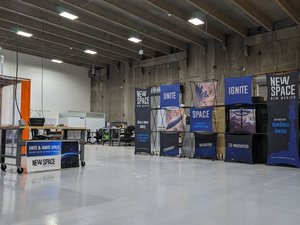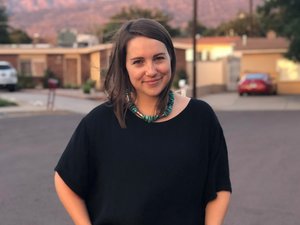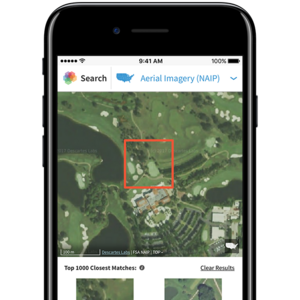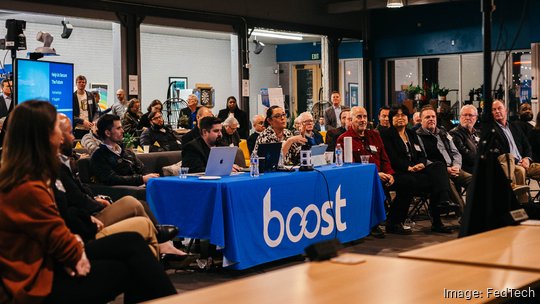
Around six months ago, an unexpected email caught Andre Gafford's attention.
Sent by Arlington, Virginia-based deep tech venture firm FedTech, it contained information about a new program focused on a series of cutting-edge national laboratory technologies, including energy, software and biotechnology. Gafford, a Texan with nearly two decades of experience in the oil and gas industry, receives a lot of emails, usually asking about surveys or consulting work with some fee.
The FedTech email, alternatively, said the tech-focused program had no pay involved.
"That really intrigued me," Gafford told New Mexico Inno. "So, I clicked into the email and read about the program, and I thought, 'Wow, this is really what I've been looking for.'"
Fast forward to this December: Gafford found himself in Albuquerque, pitching his new company, Axis Sky Renewables, to a group of three judges as part of a showcase event. That pitch followed months of work building out the concept and business case for the startup, which wants to commercialize a vertical-axis wind turbine technology — a sort of non-traditional turbine that, instead of using three large pinwheel blades spinning high in the air, uses a series of blades that rotate around a vertical base lower to the ground.
Those judges — Randy Trask from the New Mexico Trade Alliance, Dana Catron from New Mexico State University's Arrowhead Center and Mark Billingsley from the University of Alaska Fairbanks's Center for Innovation, Commercialization and Entrepreneurship — awarded Axis Sky Renewables first place as part of the pitch competition. That recognition earned Gafford and co-founder Jason Moncrieff, an engineer from Alaska, $2,000 to help scale the startup and additional consulting and advisory services.
The business coaching and technology licensing information that came from a 16-week boot camp, which preceded the pitch event, was "invaluable" for Axis Sky Renewables, Gafford said. Axis Sky's coach, in particular, shared relevant news articles with the founders and helped the startup build out its pitch deck.
Other parts of the program included helping company founders learn how to raise money and where their respective technologies fit into certain markets. That latter aspect was a bit less valuable for Gafford, he said, because of his previous energy industry experience and past work leading other companies.
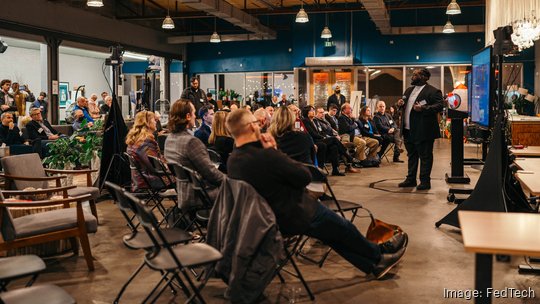
Besides Axis Sky, eight more startups built from national lab technologies pitched during the showcase event, held at Albuquerque's Q Station on Dec. 12. All of those companies were built out of a program called the "Boost Platform" — a partnership between New Mexico's Sandia National Laboratories and FedTech to spin successful startups out of national laboratory technologies to help meet the energy needs of underserved communities.
The other startups that pitched during the Dec.12 event include:
- Conquiro.ai, which uses artificial intelligence to help monitor hospital assets. (Conquiro.ai won second place in the pitch competition.)
- BoostPV, which is built around a cover technology that boosts solar panel efficiency. (BoostPV won third place in the competition.)
- OneRecycle, which is developing a new way to recycle batteries.
- HydrokinetX, which is working on a technology to generate electricity at sea using the kinetic energy of waves.
- GridFlow, which is building an energy storage solution for residential backup power.
- CyBRR Security, which is developing a software retrofit mechanism to protect industrial energy facilities from cyber threats.
- Clean Aqua Solutions, which is working on an algae flow-ways technology to purify water.
- Mandjet Microgrid, which is building a microgrid communications network.
Program focused on fostering diverse entrepreneurs
New Mexico and Alaska — two mostly rural states with diverse communities — are the initial focus of the Boost program, which is funded by the U.S. Department of Energy's Technology Commercialization Fund. The startup studio will expand out to other regions in the future, according to a March news release from FedTech.
One of the program's fundamental goals, said Mary Monson, the senior manager for technology partnerships and business development at Sandia National Laboratories, is to engage a more diverse group of startups working with national labs.
"Research consistently shows that only a sliver of venture capital funding goes to women and minority startup founders," Monson said in a statement. "This national disparity hits diverse states like New Mexico and Alaska especially hard, making it exceptionally difficult for many local innovators to get a foothold in the marketplace.
"Partnerships with national laboratories can be one source of support to offset this imbalance," her statement continued. "Boost adds to the focus on opportunities for New Mexican and Alaskan business leaders, entrepreneurs and investors to further build their states' tech industry."
Monson told New Mexico Inno at the Dec. 12 event that local, underserved communities often have unique needs when it comes to energy production, transportation and storage, as well. For example, she said challenges like smaller workforces and lack of resources can make it difficult for those communities to access emerging technologies.
Startups built out of the Boost platform, Monson added, can help extend those sorts of technologies to those underserved populations.
A local example of innovation out of the program
One founder who pitched during the showcase event was Charles "Chuck" Call, Ph.D. He and co-founder Blake Ridgeway presented GridFlow, which is built around a unique type of battery storage technology.
Just over two months prior to pitching GridFlow, New Mexico Inno reported on a different venture Call has in the works. Called Integrated OffGrid, the startup has plans to build and sell a pair of products — small units that can produce water using solar energy, and larger sustainable home kits.
Integrated OffGrid and GridFlow are technically one company at this point in time, Call told New Mexico Inno, with GridFlow acting as an "embedded business unit" under Integrated OffGrid. While GridFlow is getting a visibility boost through the Department of Energy-funded program, Integrated OffGrid is continuing to develop, with a first prototype of its "water box" unit anticipated this spring.
Market signals, Call added, will point he and Ridgeway in certain directions. For instance, if the co-founders find more focus is needed for the battery storage tech, they'll focus on developing GridFlow and likely spin it out as a separate company.
"Either way, we will push forward on both technologies as aggressively as our resources will allow," Call said.
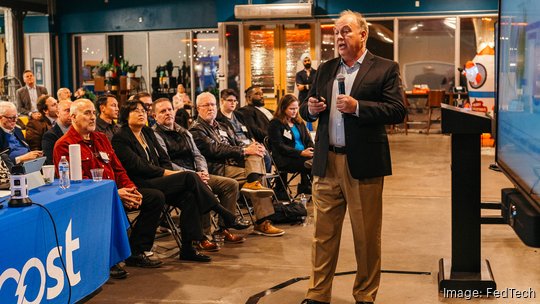
Call has previous experience building and developing startups. He left Albuquerque-based biothreat surveillance company BioFlyte in August to focus on Integrated OffGrid.
He told New Mexico Inno in September that his previous experience working in deep tech and energy systems — what he described at the time as "building hardware and putting it in the field" — will help him develop the two very early-stage startups.
'It takes courage, it takes vision'
Gafford, co-founder of Axis Sky Renewables, said his startup's next step is raising money. Those funds will help the startup further develop its wind turbine technology and create its initial prototypes.
Axis Sky, based in Houston, needs around $10 to $12 million to hit that point, he added. The mentorship and resources gained through the Boost program, as well as the startup's prize for landing first place at the pitch competition — which Gafford told New Mexico Inno via email he values at around $5,000 — will also be instrumental in moving Axis Sky forward.
"I think people need to know that these types of services are available," Gafford said. "That there are programs that will help you develop these companies and give you all the tools you need to be successful. It just takes dedication, it takes courage, it takes vision — it takes being able to see something that's not here yet and going through all the rigors to make it happen."

